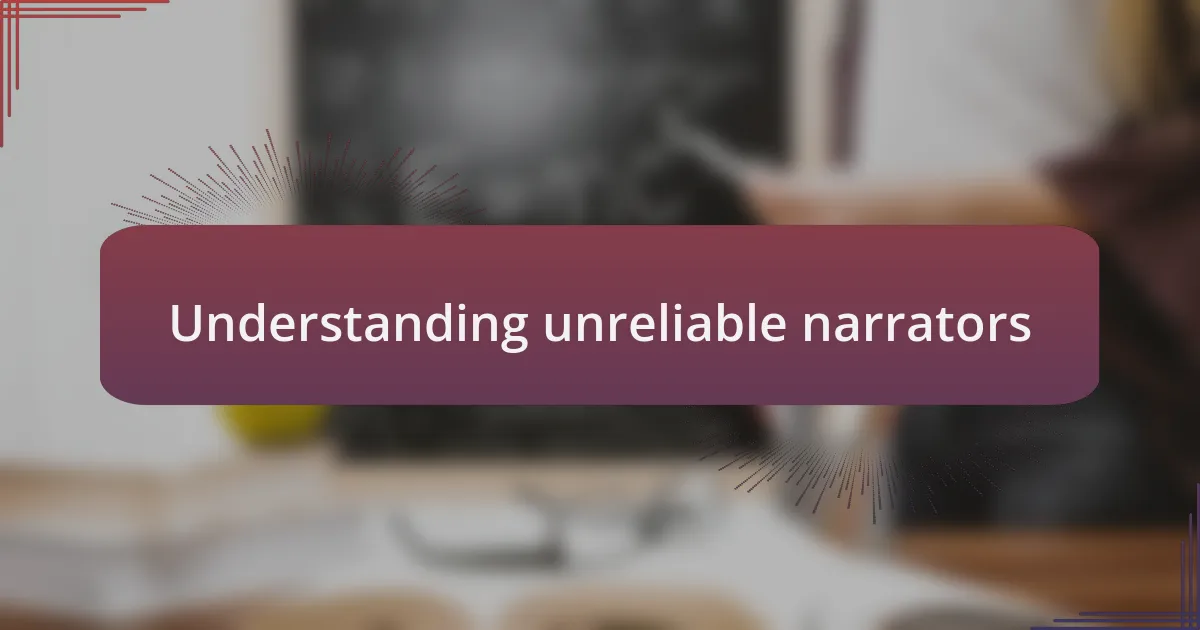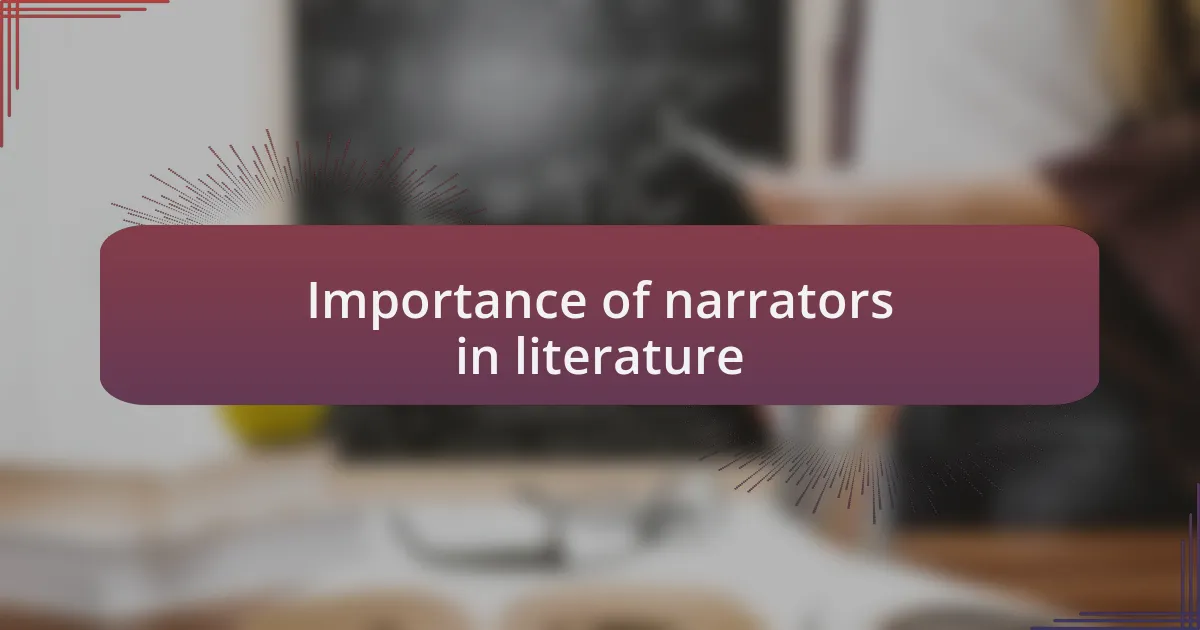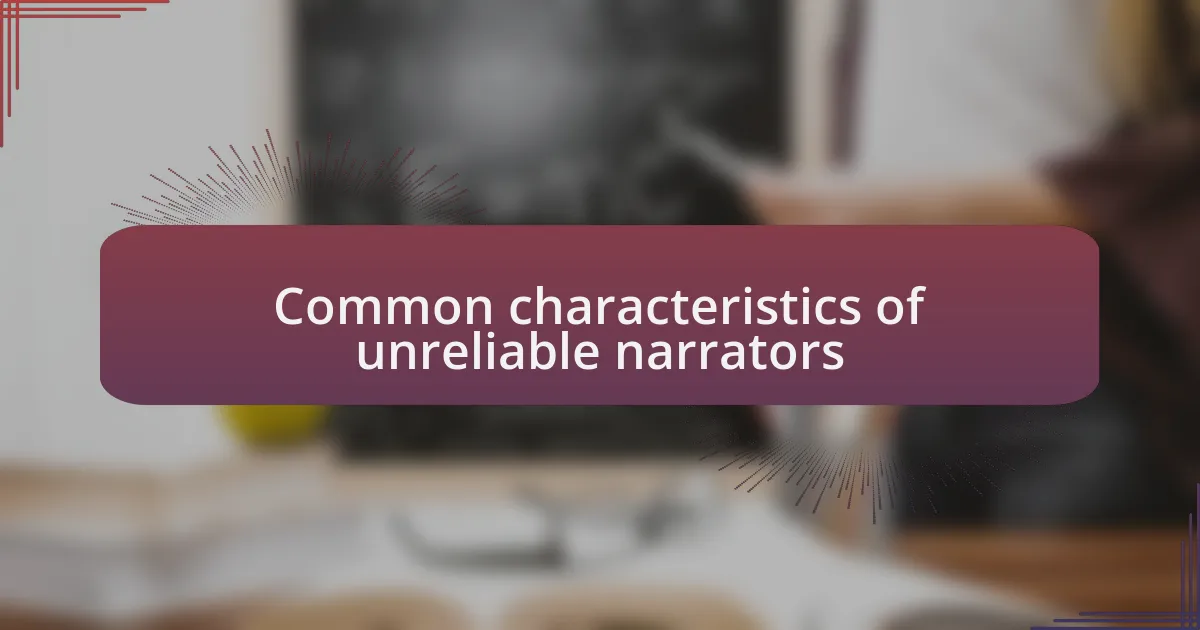Key takeaways:
- Unreliable narrators offer unique perspectives, challenging readers to question the truth and engage critically with the narrative.
- Narrators shape our emotional connection to stories, guiding us through themes and influencing how we interpret character motivations.
- Common traits of unreliable narrators include skewed perceptions, self-interest, and inconsistencies, which create tension and enhance reader involvement.
- The presence of unreliable narrators prompts readers to reflect on their own biases and the nature of truth in both literature and real life.

Understanding unreliable narrators
Unreliable narrators can be fascinating yet perplexing. They offer readers a unique perspective where the truth often becomes obscured. I remember reading The Catcher in the Rye and finding myself questioning every word Holden Caulfield said. Was he telling me the whole truth, or was his skewed view of the world the real story?
As I delved deeper into this concept, I started to appreciate the art behind an unreliable narrator. They don’t just distort the truth; they invite us to unravel the layers of their narrative, challenging us to become detectives in the story. Isn’t it intriguing how I sometimes feel more connected to the narrator’s flaws than the plot itself?
It’s often a personal journey to decipher who we can trust within the pages. I’ve found that an unreliable narrator can evoke strong emotions—frustration, confusion, even sympathy. Have you ever felt torn between wanting to believe them and the nagging doubt that arises? It’s this tension that makes the reading experience rich and engaging, enhancing the complexity of the story.

Importance of narrators in literature
Narrators play a crucial role in shaping our connection to the story and its characters. When I think about my favorite books, the narrators often stand out in my memory as vividly as the plots themselves. They guide us through the twists and turns of the storyline, setting the tone and influencing our emotions. How often have you found yourself swept away by a narrator’s voice, feeling as though they are speaking directly to you?
A well-crafted narrator not only delivers the narrative but also invites us into their mind. This intimacy can create a distinctive emotional bond. For instance, in The Great Gatsby, Nick Carraway’s reflections on Gatsby’s life offer a lens through which we interpret ambition and longing. As I read, I felt as if I was sharing secrets with Nick, wrestling with the complexity of truth and perception. Don’t you love when a narrator makes you question your own judgments?
Moreover, narrators can serve as filters for the themes within a work, helping to convey deeper meanings and societal critiques. Think about the impact an unreliable narrator can have. They force us to examine our assumptions and biases, revealing how easily our understanding of reality can be manipulated. This challenge can enrich our reading experience, prompting us to think critically about not only the story but also the narratives we encounter in our everyday life. How does that change the way you perceive the narratives you hear?

Common characteristics of unreliable narrators
Unreliable narrators often exhibit a skewed perception of reality, which is one of their defining traits. I remember reading a novel where the narrator clearly misinterpreted events due to personal biases, leading to an experience that felt disorienting yet captivating. It made me question how much we can trust our own perceptions—have you ever considered how your mood might alter your interpretation of a situation?
Another common characteristic is self-interest. These narrators tend to prioritize their desires or fears, clouding their judgment. In one book I read, the protagonist’s selfish motivations became evident, transforming their seemingly innocent narration into a sinister lens. It left me wondering: how many stories are shaped by ulterior motives, and how does that affect our engagement with the characters?
Additionally, unreliable narrators often display inconsistencies in their accounts. I recall a story where the plot twisted with each revealing chapter, leaving me unsure of what to believe. This element creates a tension that can be both thrilling and frustrating. Isn’t it fascinating how these contradictions push us to become active participants in decoding the narrative, engaging our critical thinking as we sift through layers of truth?